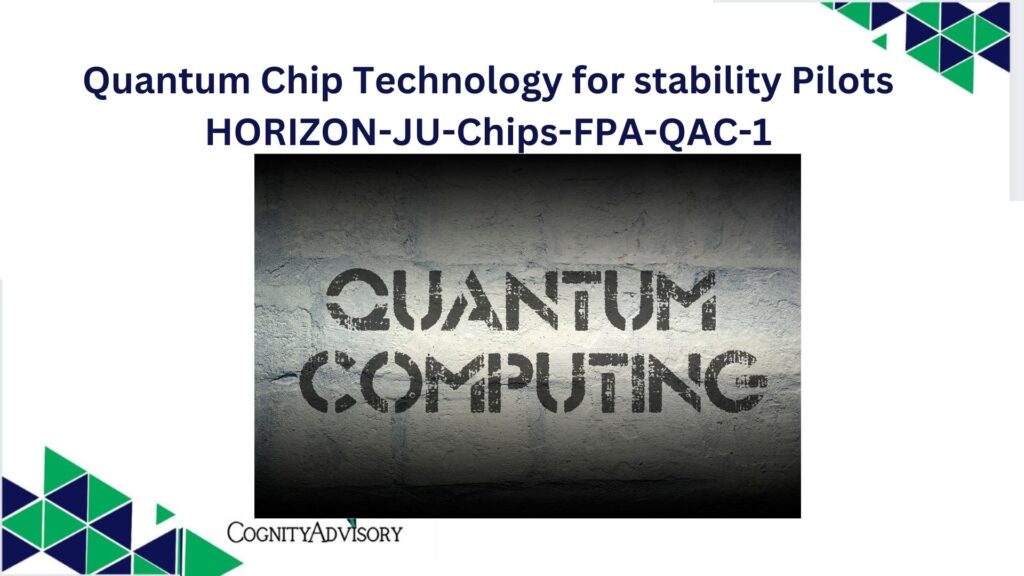HORIZON-JU-Chips-FPA-QAC-1
General information
Programme
Horizon Europe (HORIZON)Budget overview
Call
Type of action
HORIZON-FPA HORIZON Framework Partnerships
Type of MGA
HORIZON Framework Partnership [HORIZON-FPA-AG]
Forthcoming
Deadline model
single-stage
Planned opening date
24 September 2024
Deadline date
21 January 2025 17:00:00 Brussels timeTopic description
Expected Outcome:
The aim is to support two or more pilot lines implemented through a Framework Partnership Agreement establishing a stable and structured long term partnerships between the Chips JU and consortia of industry, research organisations and the institutions in quantum technologies who commit themselves to establishing, coordinating and implementing a strategic and ambitious R&I initiative for the development of innovative quantum chips, followed by an ambitious action for building and deploying pilot lines.
The partnerships will be set up through one FPA per technology platform, which will ensure the implementation of the initiative through several consecutive Specific Grant Agreements (SGAs) that will carry out the different activities in a common framework. The SGAs will be implemented as Research and Innovation Actions (RIA) or Innovation Actions (IA) in function of the concrete objectives of the action. The FPAs should be carried out in different phases, which will be triggered after the attainment of appropriate intermediate progress milestones identified by the consortia. The FPAs will permit the coordinated development of the technology, its validation and the nurturing of the ecosystem. The developments should be integrated in one pilot demonstrator per FPA to validate the developments and demonstrate the scalability potential.
The infrastructures of the pilot lines should be installed in a pre-operational environment in the facilities of the hosting entities. The FPAs and SGAs should target delivering components for building and deploying in the EU of quantum technologies based on European technology.
The FPAs are expected to pursue an inclusive approach in the development of the necessary EU-wide quantum ecosystem, ensuring European wide participation of relevant stakeholders across the EU and take-up of the technology developed.
The FPAs should include research institutes, universities, RTOs, industry, including SMEs as well as any other organization that can play a role in the realization of the objectives of the initiative.
The FPAs should describe the planned mechanisms guaranteeing that all IP generated in the initiative stays in the EU and will not be transferred to third countries, dedicating an appropriate effort to IP management, protection and exploitation (i.e. IP licensing, IP warranty, etc.).
The FPAs should present a professional project structure management, a strategic R&I roadmap to implement the activities, and governance that are appropriate to coordinate the implementation of the future SGAs, including addressing the industrial use cases, and to deliver effectively and efficiently the main results of the initiative.
The FPAs should put in place appropriate management and progress control mechanisms, in particular, the establishment milestones for the SGAs assess the correct advancement of the work towards the goals of the overall initiative.
The FPAs should establish interaction with the relevant stakeholders and pilot lines and the design platform of the Chips JU to coordinate work on horizontal issues and exploit synergies where relevant.
The FPAs are expected to achieve Technology Readiness Level (TRL) 8. The actions implemented under the first SGA are expected to achieve Technology Readiness Level (TRL) 6.
Proposals should address the following activities:
- Developing scalable production processes for quantum chips in view of building industrial production processes.
- Integrating cutting-edge Quantum Process Design Kits (PDKs) with European virtual design platforms to standardize production and reduce the need for custom developments.
- Enhancing technology (including enabling technologies) and manufacturing readiness levels across the quantum industry, addressing applications in one or more of the following: quantum computing, communications, simulation, and/or sensing.
- Establishing standardized methodologies for the design, test, and manufacturing of quantum chips to streamline production processes and broaden the application sectors.
- Demonstration of scalable, efficient, and stable production capabilities, aiming at high yield25. The development of robust and repeatable manufacturing processes tailored to quantum chips’ unique requirements, enabling a consistent and reliable supply for European stakeholders.
- Developing reliable characterization tools to ensure quality assurance of quantum chips, ensuring consistency and reliability across production batches, and demonstrating the scalability of pilot line technologies from small-to-mid volume fabrication to potentially large-scale industrial production.
- Define a technology roadmap and implementation plan towards industrialisation of the production of quantum chips.
